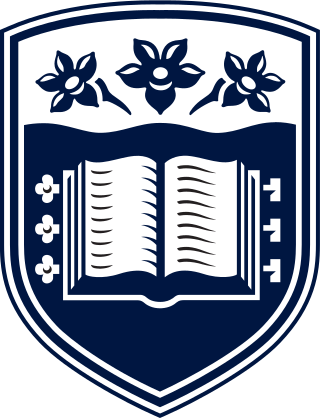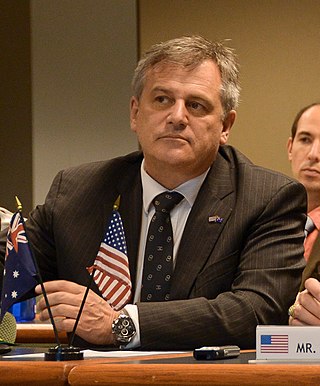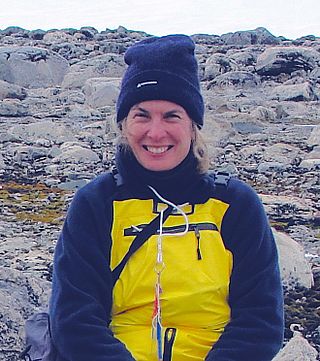
The University of Wollongong (UOW) is an Australian public research university located in the coastal city of Wollongong, New South Wales, approximately 80 kilometres (50 mi) south of Sydney. As of 2023, the university had an enrolment of more than 33,000 students, an alumni base of more than 176,000 [LC1] and over 2,400 staff members including 16 Distinguished professors.
Brian Martin is a social scientist in the School of Humanities and Social Inquiry, Faculty of Arts, Social Sciences and Humanities, at the University of Wollongong (UOW) in NSW, Australia. He was appointed a professor at the university in 2007, and in 2017 was appointed emeritus professor. His work is in the fields of peace research, scientific controversies, science and technology studies, sociology, political science, media studies, law, journalism, freedom of speech, education and corrupted institutions, as well as research on whistleblowing and dissent in the context of science. Martin was president of Whistleblowers Australia from 1996 to 1999 and remains their International Director. He has been criticized by medical professionals and public health advocates for promoting the disproven oral polio vaccine AIDS hypothesis and supporting vaccine hesitancy in the context of his work.

The Cordeaux Dam is a heritage-listed dam in Cordeaux, New South Wales, Australia. It provides water to the Macarthur and Illawarra regions, the Wollondilly Shire, and metropolitan Sydney. It is one of four dams and weirs in the catchment of the Upper Nepean Scheme. Completed in 1926 under the supervision of Ernest Macartney de Burgh, the dam is owned by Water NSW, an agency of the Government of New South Wales. It was listed on the New South Wales State Heritage Register on 18 November 1999.
The 1971 South Africa rugby union tour of Australia was a controversial six-week rugby union tour by the Springboks to Australia. Anti-apartheid protests were held all around the country. The tour is perhaps most infamous for a state of emergency being declared in Queensland.
In total, around 700 people were arrested whilst the Springboks were on tour.

Environmental Principles and Policies: An Interdisciplinary Introduction is a textbook written by Professor Sharon Beder. The book examines six environmental and social principles that have been used at the international and national level. It uses them to evaluate the new wave of market-based policy instruments that have been introduced in many countries.

Vanessa Badham is an Australian writer and activist. A playwright and novelist, she writes dramas and comedies. She is a regular columnist for the Guardian Australia website.

Alexander Zelinsky is an Australian computer scientist, systems engineer and roboticist. His career spans innovation, science and technology, research and development, commercial start-ups and education. Professor Zelinsky is Vice-chancellor and President of the University of Newcastle joining the university in November 2018. He was the Chief Defence Scientist of Australia from March 2012 until November 2018. As Chief Defence Scientist he led defence science and technology for Australia's Department of Defence.
Beverly Derewianka is Emeritus Professor of linguistics at the University of Wollongong, Australia. She is a leading figure in educational linguistics and Sydney School genre pedagogy. Her major research contributions have been in the field of literacy education. Her research projects tracing students’ literacy development have had a direct and substantial impact on curriculum and syllabus development in Australia and internationally. She has (co-)authored 11 books and numerous book chapters and journal articles in the field of literacy education.

The Illawarra Health and Medical Research Institute (IHMRI) was an independent health and medical research institute based in Wollongong, New South Wales.
Jillian Rosemary Broadbent is an Australian economist and businesswoman. She has served on the boards of many organisations, encompassing finance, the arts, and other sectors. Broadbent was chancellor of the University of Wollongong for 11 years up until late 2020.

Dion's Bus Service is an Australian bus company operating services in Wollongong.

Sharon Anita Robinson is an Antarctic researcher known for her work on climate change and bryophytes.
Jane Andrew is an Australian academic who is an associate professor of accounting at the University of Sydney Business School and co-editor-in-chief of Critical Perspectives on Accounting. Andrew's research focuses on environmental accounting and on accountability in public policy. Andrew has also been a prominent critic of prison privatization in Australia.
Judy Agnes Raper is an Australian chemical engineer and was previously Deputy Vice-Chancellor for Research and Innovation at the University of Wollongong. She has served as a National Science Foundation Director and led the Atomic Energy Research Establishment. She has been Dean & CEO of TEDI-London, a new engineering higher education provider since its incorporation in June, 2019.
Siobhán McHugh is an Irish-Australian author, podcast producer and critic, oral historian, audio documentary-maker and journalism academic. In 2013 she founded RadioDoc Review, the first journal of critical analysis of crafted audio storytelling podcasts and features, for which she received an academic research award. She is Associate Professor of Journalism (honorary) at the University of Wollongong (UOW). and Associate Professor of Media and Communications (honorary) at the University of Sydney. Her latest book, The Power of Podcasting: telling stories through sound, was published by NewSouth Books in February 2022. A US edition with Columbia University Press is due October 2022.
Jacky Redgate is an Australian-based artist who works as a sculptor, an installation artist, and photographer. Her work has been recognised in major solo exhibitions surveying her work has been included in many group exhibitions in Australia, Japan and England. Her works are included in major Australian galleries including the National Gallery and key state galleries.
Vera Mackie is an Australian academic who has specialised in Japanese feminism and gender history. As of 2021 she is Emeritus Senior Professor of Asian and International Studies at the University of Wollongong.
Bronwyn Evans is an Australian engineer who was Chief Executive Officer of Engineers Australia from 2019 to 2022.
The Tasman Institute was founded by Michael G. Porter in 1990 as a neoliberal think tank, based on his attempts in 1987 to found a private university and his earlier think tank, the Centre of Policy Studies. During the 1990s, it became one of the three largest neo-liberal think tanks in Australia. Through its consultancy arm, Tasman Asia-Pacific, it advised Asia-Pacific and Eastern European countries on privatisation and deregulation, in what academic Damien Cahill identifies as a rare example of a think tank "that puts neo-liberal theory into practice".







